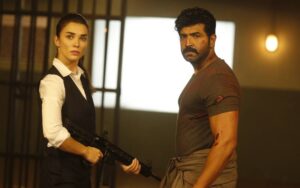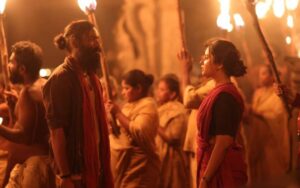Review : Merku Thodarchi Malai

Film: Merku Thodarchi Malai
Dir: Lenin Bharathi
Cast: Antony, Gayathri Krishna, Abu Valayangulam, Aarubala, Anthony Vaathiyaar and others
Music: Isaignani Ilaiyaraaja
Cinematography: Theni Eshwar
It’s only once in a while that a film as brilliant as Merku Thodarchi Malai gets made. Such brilliance makes any other film in comparison look less than ordinary. More importantly, when films like Merku Thodarchi Malai release, they effortlessly raise the bar for the entire film industry by a notch.
Director Lenin Bharathi’s Merku Thodarchi Malai transports you to the foothills of the western ghats, where simple, hardworking rural folk from Tamil Nadu make their way to the top of the towering mountains every single day to work in the cardamom estates on the Kerala side of the border.
While all the women and some men work in the estates, picking cardamom, most men are assigned the excruciatingly painful and demanding exercise of carrying back the sacks of collected cardamom on their heads, through the narrow winding paths of the majestic mountains.
Braving wild animals, the men make the arduous journey, negotiating their way down the treacherous pathways even as they carry the heavy sacks of cardamom on their heads for a pittance.
They thus eke their livelihood with the money they make by working this hard. What’s more, they also save money in the hope of one day owning land in the plains.
How these labourers struggle to make ends meet and how, despite the superhuman effort that they put in on a daily basis consistently, their standard of living does not improve is all brought out beautifully in this masterpiece of a film by Lenin Bharathi.
The film revolves around the life of Rangasamy (Antony), a labourer who has been saving money to buy land in his mother’s name. After having slogged for years, he is on the verge of buying a piece of land when the owner, due to his wife’s influence, has a change of heart at the last moment and refuses to sell the land.
A disappointed Rangasamy continues to go up the mountains to work everyday and returns. It is at this point in time that his uncle offers his daughter’s hand in marriage. Rangasamy does not want to marry until he buys land but the elders in the village and his mother advice him to marry Eshwari (Gayathri Krishna) and then pursue his dream of buying land.
He heeds their advice and the wedding takes place. Together, Rangasamy and Eshwari lead a simple but peaceful life. Days pass by and an old lady having a tea shop at the foothills decides to sell off her land to conduct her granddaughter’s marriage. She offers her land to Rangasamy, who finds that he is falling short of the money required to buy it.
To make up the difference, he takes the advice of an elderly person and offers to buy a sack of cardamom from his estate owner at the base price and then sell it to make a profit.
His owner too graciously agrees and gives him a sack of cardamom at its base price. Just when they are returning with his sack of cardamom, misfortune befalls them and the sack of cardamom falls off the mountain. A distraught Rangasamy and his family are inconsolable.
Just when Rangasamy and his family members give up any hope of buying the land, they are in for a surprise.The man for whom Rangasamy’s dad worked offers to buy the land for him for free as a token of his gratitude for the work that his father put in.
Rangasamy refuses to take if for free and says he will pay back the money he spent on buying it for him, little by little. The dad’s boss agrees, just to keep Rangasamy happy.
Days pass but then, farming isn’t easy. Soon, a new set of problems arise with greedy land estate owners in Kerala devising new ways to exploit labourers. The conflict between the unscrupulous Malayali owners and the labour unions, headed by Communists result in violence. Soon, a peaceful, hardworking, sincere Rangasamy finds himself being drawn into a conflict he never wanted. He ends up paying a costly price for losing his temper for a very valid reason…
The stuggle of the labour class to turn into land owners and the cruel ways that society devises to keep them at the bottom of its class system is so beautifully told in this film that it is hard not to admire the work of the director.
The actors of the film literally blend into the story. So perfect is the casting that there is not a single person who looks out of place or sorts in the film. Special mention needs to be made of the efforts put in by the lead actors Antony who plays Rangasamy and Gayathri Krishna who plays Eshwari. Both of them look like as if they have always been a part of the rustic landscape. It might probably be because of the fact that the director made the hero work as a labourer for a year in the foothills to prepare him for the role.
The heroine too was made to pick cardamom in the estates like any other labourer for several weeks. No wonder then that they both look their parts.
Their performances are natural and excellent, leaving no room whatsoever for complaint.
The settings are real, the people around the lead artistes are real and the terrain where the film has been shot is real. There is nothing whatsoever that is artificial about this film — be it the story, the people, or the difficulties that they face.
Antony, who makes his debut with this film, is bound to go places. The role of the soft, amicable, humble, hardworking labourer that he plays, is bound to stay on in the hearts of film lovers for a very long time to come.
Gayathri Krishna, who already has delivered a fantastic performance in her previous film Joker, comes up with yet another dazzling performance as Eshwari, the wife of a daily labourer.
Abu Valayangulam as Saako also does a fantastic job as the Malayali communist leader who stands up against greedy Malayali landowners who chide him for supporting Tamil labourers.
The film has extraordinary cinematography by Theni Eshwar. In fact, the film’s cinemtography is world class. Take for instance the manner in which the film begins. It begins with Rangasamy beginning his day at 4.30 in the morning. As his day progresses and the sun begins to rise, the lighting changes and so does the shot angle. He gives you a breathtaking view of the western ghats even as the first light begins to arrive. That just takes your breath away.
Another instance when Eshwar shows his master class is when the labourers begin making their way from the top of the mountain to the foothills. The camera slowly starts zooming out and at one point, an aerial shot gives you an idea of the distance the sack-carrying labourers have to make. Through out, the cinematography is top notch.
Ilaiayaraaja’s background score is another highlight. The master musician does not only know the value of music but also the value of silence. For most part of the film, he gives no background score, save the sound of the breeze in the region.
In all, Lenin Bharathi deserves a standing round of applause for this masterpiece that has been produced by Vijay Sethupathi.








